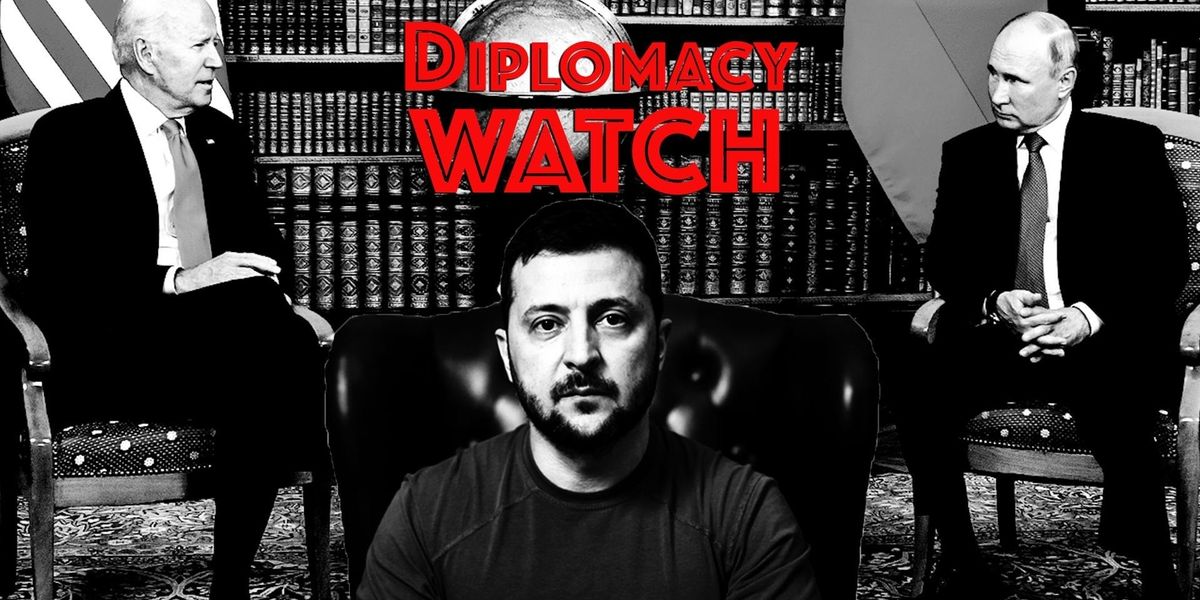Italian defense minister Guido Crosetto said Wednesday that his country had to be “realistic” about Ukraine’s battlefield prospects and that “the time seems to have come for effective diplomatic action.”
Crosetto said that Italy and Europe had to maintain its military support for Ukraine, but that continued aid did not mean avoiding talks of diplomacy.
“We have two paths: that of aid without ‘ifs and buts,’” explained Crosetto. “And that of attempting to build a diplomatic path that brings us to the end of the conflict. The coming months will have to balance deterrence and diplomacy.”
The defense minister’s formulation is similar to those made by advocates of diplomacy in the United States, but is quite notable given Italy’s steely support for Ukraine’s war effort in the past.
“It is quite true, as the Biden administration has warned, that ending U.S. aid to Kyiv would quickly result in Ukraine’s collapse. Sufficient aid to help Ukraine to stand successfully on the defensive should therefore continue,” the Quincy Institute’s George Beebe and Anatol Lieve wrote in RS this week. “But what U.S. policymakers need to understand and honestly acknowledge is that absent a compromise peace settlement, massive levels of aid will have to continue not just for the coming year, but indefinitely.”
When Giorgia Meloni became Italy’s prime minister in October 2022, there were concerns that Rome might back off of its support for Kyiv’s war effort. But under Meloni’s leadership, Italy has continued to deliver aid to Ukraine, and is now preparing an eighth tranche of military support.
Crosetto, though, said that the disappointing outcome of Kyiv’s counteroffensive means that it is time to pursue a new approach.
The Italian minister said that he had noticed “important signals” from both Moscow and Kyiv that made him optimistic about the prospect of peace talks, saying that both sides had shown signs of war fatigue and internal dissent.
“In Ukraine, the domestic front no longer appears as united as in the past in supporting President Zelenskyy’s policies, highlighting some political differences,” Crosetto said.
Publicly, however, neither Russia’s Vladimir Putin nor Ukraine’s Volodymyr Zelensky have significantly shifted from their rhetoric at the start of the war.
Putin said during a recent end-of-year press conference that his goals remain “unchanged” and that there will be peace only when he achieves his objectives. Zelensky for his part said last month that discussions of peace talks were “not relevant” and that he will be willing to speak to Putin if Moscow accepts Ukraine’s ten-point peace plan, which calls for the withdrawal of all Russian troops from all Ukrainian territory. Zelensky repeated during a surprise trip to Lithuania on Wednesday that, contrary to recent reports, he has received “no pressure” from allies to freeze the conflict and enter negotiations.
In other diplomatic news related to the war in Ukraine:
—Ukraine and a group of allies held a secret meeting in Riyadh in mid-December to try to solidify support for Kyiv's vision of a peace plan, according to Bloomberg. The summit followed a series of similar meetings over the last year, including ones in Copenhagen, Jeddah, and Malta, and before the next publicly announced one in Davos later this month. The discussions have featured evolving groups of countries from the West and Global South, though Russia has yet to be invited. Representatives from India, Saudi Arabia and Turkey were reportedly at the latest summit, though those from other nations who were present at previous iterations, including China, Brazil and the United Arab Emirates, did not attend.
“There was no major progress at the latest meeting, held in Riyadh, according to people familiar with the session who asked for anonymity to discuss matters that aren’t public. Ukraine and its G-7 allies continued to resist calls from the Global South nations to engage directly with Russia,” reports Bloomberg.
—National security adviser Jake Sullivan convened a meeting with companies from the defense industry on Monday to discuss how battlefield technologies could support Ukraine’s war effort, according to the Los Angeles Times. The meeting reportedly included executives from Palantir, Anduril, and Fortem. “Officials emphasized that the discussions with defense companies are not a substitute for urgently needed supplemental funding from Congress,” reads the report. “Rather, they said, they wanted to hear directly from companies about the capabilities they are developing.”
—The Biden administration is supporting Congressional legislation that would allow it to seize $300 billion in frozen Russian assets, according to Bloomberg.
“Biden’s support for the move emerges as Republicans in Congress have blocked more than $60 billion in funding for Ukraine, partly over concerns that Washington is carrying too much of the financial burden as Kyiv’s counteroffensive stalls,” reports Bloomberg. “The idea of using Russia’s own money to finance the reconstruction of Ukraine is seen as a way to bolster US support for the war as some Republicans balk at continued funding.” The legislation has received bipartisan support in Congress, and Speaker of the House Mike Johnson (R-La.) called it “eminently responsible” during an interview last November.
U.S. State Department news:
The State Department did not hold a press briefing this week.














